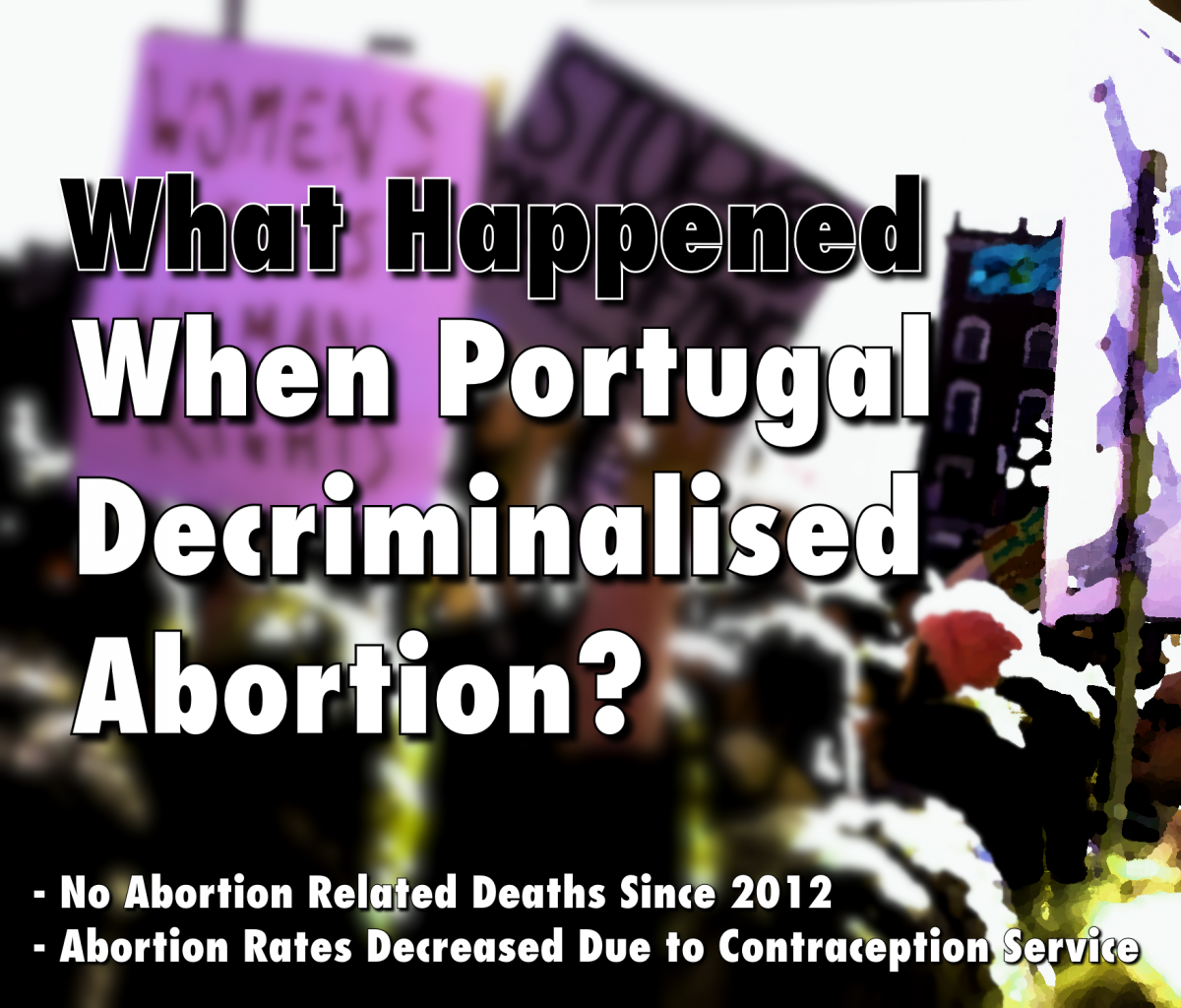Over 30 years of anarchist writing from Ireland listed under hundreds of topics
What Happened When Portugal Decriminalised Abortion?
With the referendum to repeal the 8th  amendment on May 25th drawing nearer, it’s with great interest that we look at the experience of other countries which have struggled against an abortion ban like ours, to learn from the lessons of the campaign, and to ‘look into the future’, as it were, and see the result of decriminalising abortion. As such, here are some brief notes on Portugal.
amendment on May 25th drawing nearer, it’s with great interest that we look at the experience of other countries which have struggled against an abortion ban like ours, to learn from the lessons of the campaign, and to ‘look into the future’, as it were, and see the result of decriminalising abortion. As such, here are some brief notes on Portugal.
On 11th February 2007, in a national referendum, the Portuguese voted in favor of the decriminalization of the "voluntary interruption of the pregnancy" (VGI). It was the end of more than 30 years of struggles, advances and retreats, with many public debates dividing several quarters of Portuguese society.
Eleven years after this historic moment, the information available in the Direcção Geral de Saúde (DGS) website, the governmental health agency, shows that the number of abortions has been decreasing while contraception has increased. Most pregnant people who resort to VGI do it once and safely, and there is no record of any death related to abortion since 2012.
In Portugal, the number of women who voluntarily had abortion procedure fell to 15,873 in 2015, less than in 2008 (18,607 abortions), according to the information available on the government website (of which nothing is included about trans men or non-binary people). On the other hand, the number of abortions performed by migrants increased and represents 18.5% of the cases.
Although abortion is present in all classes of the society, it prevails with highest incidence among the unemployed, with 20.4% of cases, but fell by 1.2% in 2014. Among women who performed a VGI in 2015, 70.1% had never had any other abortion.
The Sexual and Reproductive Health Program in Portugal also includes the free distribution of contraceptives for the prevention of unwanted pregnancies.
Based on the report made available by the DGS, it is possible to state that there is a decreasing trend in the number of abortions performed during the first 10 weeks of pregnancy, which puts Portugal below the European average. However, there is still a long way to go in terms of availability of information and conditions for women's access to health services, especially when there are language barriers, cultural differences or a lack of knowledge about the functioning of the health system.
1998 and 2007 Referendums
The first referendum for the decriminalization of voluntary interruption of pregnancy took place on June 28, 1998. "No" was the winner with 50.09% of the votes, but only 31% of the electorate voted.
Referendum numbers revealed a country divided in two. North, Central Portugal and islands, regions where the Catholic Church has more influence, voted overwhelmingly for the "No" and in the South, more secular, the "Yes" was a clear winner.
Several authors place abstention as the main cause of the referendum outcome, which can be explained by the lack of involvement in campaigning of the largest left-wing party, the Socialist Party, but also because of the country's dictatorial past and the consequent lack of popular participation in decision-making moments. Also, the overconfidence of the pro-choice movement, which felt too comfortable with the successive polls revealed during the campaign, or either the fact that some quarters of the Portuguese population considered that the issue of abortion “only” interests women.
There are many factors that can help explain the outcome of the 1998 referendum and what is certain is that Portugal had to wait until February 2007 for a new referendum, now with a different result. Although the country remained divided, the "Yes" won with 59.25% of the votes and with a popular participation percentage of 43.6%, which was not enough to make the result binding. But, the Portuguese Parliament respected the decision and approved, by a large majority, the legalization of the interruption of pregnancy until the tenth week, if the person wishes, regardless of the reasons.
The issues of the decriminalization of abortion were never uncontroversial because they challenged the moral principles established by the catholic church, which helps to explain the delay and the controversies generated within Portuguese society. The political parties did not want to confront the catholic hierarchies and forces, clearly conservative and dominants, showing full reverence.
Looking at the two referendums, we come to realize that the discourse was more victimizing than vindictive. Abortion was mostly addressed as a health issue, rather than a human right. For example, the right to one's own body and sexual self-determination were omitted from the campaigns, and centered only in the perspective to not send the pregnant person to jail.
It is possible to establish parallels between the Portuguese and Irish realities. We can not allow more people to risk their lives in clandestine clinics due to lack of access to safe and legal abortion procedures, to get a 14 year prison sentence by taking abortion pills, or force them to travel to other countries to do it safely. The decision to terminate the pregnancy lies with the pregnant person, therefore it is not the role of the state to prohibit or penalize those who take this decision.
References
-
ALVES, Magda and Others - A DESPENALIZAÇÃO DO ABORTO EM PORTUGAL DISCURSOS, DINÂMICAS E ACÇÃO COLECTIVA: OS REFERENDOS DE 1998 E 2007 - Available here.
-
MONTEIRO, Rosa - A descriminalização do aborto em Portugal: Estado, movimentos de mulheres e partidos políticos (Análise Social, 204,xlvii (3.º), 2012 ) - Available here.
-
https://en.wikipedia.org/wiki/Portuguese_abortion_referendum,_2007
-
https://en.wikipedia.org/wiki/Portuguese_abortion_referendum,_1998

